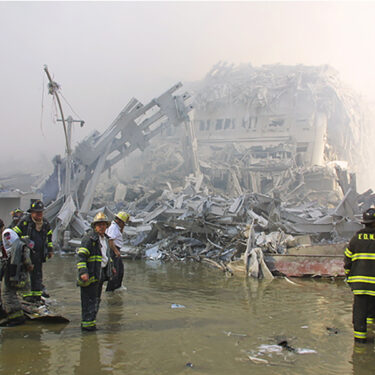
LOWER MANHATTAN — A government-funded program that provides free health care for 9/11 first responders and other survivors is running short of money, and advocates worry the financial shortfall will result in rationed care.
The World Trade Center Health Program (WTCHP), established in 2011 as part of the James Zadroga 9/11 Health and Compensation Act, was originally funded for a five-year period at a cost of $1.6 billion. In 2015, Congress voted to extend the program to ensure that it would last another 75 years — through 2090. But the program will start running at a deficit as soon as 2024 unless the government pumps more money into it, officials said.
The reason for the funding woes? Experts said the precipitous rise in health care costs and the expansion of the types of cancers covered by the program are two of the reasons.
“Obviously, that was a huge drain on the money Congress had put aside,” said Michael Barasch, a partner in Barasch & McGarry, a law firm that has represented more than 30,000 first responders and survivors in the 21 years since 9/11.
The program currently covers medical costs associated with 68 different forms of cancer, with skin cancer being the most common cancer contracted by first responders. That’s a significant rise in the number of cancers initially covered, Barasch noted.
Enrollment is still open, and each year, new people sign on. As of June 2022, 83,764 first responders and 34,710 survivors from across the country were enrolled in the program. The patients live in 434 of the 435 Congressional districts.
“If it does run out of money, that’ll mean fewer and fewer new patients getting access to this medical treatment,” Barasch explained. “And fewer and fewer people are going to get their annual exams which detect cancer early.”
Retired FDNY Deputy Chief Richard Alles, who is a skin cancer survivor and is treated through the World Trade Center Health Program, said that while there is no immediate danger, there could be trouble ahead.
“The drop-dead date would be Oct. 1, 2024, where, literally, there would be no one new allowed to enroll. The health program could conceivably be on an austerity budget,” Alles said.
“You’re talking about cutbacks. Maybe people won’t get treatment or can’t get all of their prescriptions filled,” said Alles, who is director of 9/11 Community Affairs for Barasch & McGarry.
Alles, who was stationed in Canarsie that day, got to the World Trade Center site about 20 minutes after the collapse of the North Tower. He thought he was prepared for the devastation. “But your mind can’t catch up to what your eyes are seeing,” he recalled. “You know this happened, but it feels like a dream. It’s just too much to absorb. Then, you kick into your training.”
At first, Alles and his colleagues thought they were going to find people alive in the rubble. “Little did we know that we wouldn’t find anyone alive,” he said.
Alles spent the next several months working on the effort to recover victims’ remains. Like many who were exposed to the toxins at ground zero, he suffered health problems. He was diagnosed with skin cancer in 2010. “Fortunately for me, it got picked up early. It was on my neck, and I ended up having surgery and have a scar on my neck,” he explained.
Many are worried that as news of the WTCHP financial problems spread, it might discourage new people — especially non-responders — from enrolling.
“Firefighter unions and police unions have done a wonderful job getting the word out about the program. But the 300,000 office workers who were working south of Canal Street, the students and teachers, and downtown residents don’t have any union telling them about the program,” Barasch lamented.
Not only that, doctors and nurses may leave the program, Barasch predicted. “If you’re a doctor or nurse and you’re worried about losing your job because the funding is going to be over, you’re going to start looking for a new job. That means a lot of people in the 911 community are going to lose access to the best nurses and doctors,” he said.
According to advocates, the solution is simple: Congress must appropriate additional funding for the program.
There is some movement in Washington D.C. but there have also been near-misses. There was a provision in the Build Back Better bill touted by Democrats that contained $3 billion for the World Trade Center Health Program. However, the bill didn’t pass.
Republican Congresswoman Nicole Malliotakis, whose Staten Island-Southern Brooklyn district lost more than 300 people on 9/11, is a co-sponsor of the 9/11 Responder and Survivor Health Funding Correction Act, a bill that would provide funding to keep the program going.
The bill, which was introduced last year, was referred to the House Energy & Commerce Committee. In July, several members of Congress, including Malliotakis, wrote a letter to Congressman Frank Pallone of New Jersey, the committee chairman, urging him to move the legislation forward.
“Congress should expeditiously move towards solidifying the WTCHP so all of the men and women who responded and survived the Sept. 11 terrorist attacks will continue to have the health coverage they deserve,” the letter read in part.
Meanwhile, advocates are pushing Congress, but many said they are growing weary of periodically having to fight for funding for 9/11-related programs.
“It’s very frustrating,” Alles said, “and it’s like Groundhog Day.”

